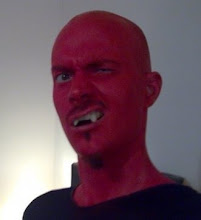Daybreakers
Slotting into the end-of-the-world zeitgeist that has built up with the renewed interest in the latest installments of two popular 70s genres, the disaster movie and zombie movie, Daybreakers performs the coup of covering both the tail end of the human race and the collapse of those responsible - in 2019 a vampire infection has spread so rapidly that they now comprise 95% of the population of Earth, with the last few humans hunted down in order to be farmed for blood.
Opening with a suicide scene where a young girl leaves a note and waits in the garden for sunrise, only to burst into flame, we than have sections of the note highlighted - frustrations at never growing up - then into the titles. This involves snippets of headlines and news broadcasts that fill in the back story. It seems a bat is responsible for kick-starting the infection in humans, and now vampires have become so numerous that blood supplies are running dangerously low and they are desperately trying to create a synthetic substitute.
The effort to create a new world adapted for vampires is admirable - subwalks, underground tunnels that connect buildings in cities, have been constructed so that vampires can move about during the day, and cars have modifications which block out the light and instead use cameras to feed video of the outside world in order to drive in sunlight. Smoking has enjoyed a rise in popularity, understandably as there is no health threat to the immortal undead and it provides a distraction from blood hunger as stocks dwindle, but well observed details like these also raise questions: in one scene the camera pans across a group of young vamps hanging out in what appears to be some sort of school uniform, and smoking with the studied insolence of the adolescent. But now that smoking is no longer taboo, why is the act an opportunity to display teen rebellion? And more importantly the majority of the teen vamps would be in their twenties by now seeing as the infection began a decade before - why carry on the teen act? Of course there is the possibility that vestigial social conventions still cling on, but it doesn't explain where the tobacco comes from - who grows it and how? If it's produced in indoor greenhouses how is photosynthesis achieved without killing the vampires?
Happily the film isn't chock full of such inconsistencies and within the horror genre Daybreakers does a pretty thorough job at creating a believable world, to the extent that you would pick up on niggles such as the cigarettes rather than just dismiss the whole thing as rubbish.
The themes underlying the film aren't exactly subtle; the baddies aren't just vampires, but represented by the corporation that farms blood and researches a substitute, and its CEO played by Sam Neill, whose fake fangs seem a little ill-fitting compared to the rest of the cast. Then you have the military industrial complex in the form of the vampire army which hunts humans in daylight with tricked out humvees, full body anti-sunlight armour and automatic tranquiliser rifles. Further social commentary comes from the juxtaposition of the slick, suited vamps, living in fancy minimalist boxes in the city, whilst the human survivors clad in check shirts and blue jeans hole up in the countryside, setting out to rescue other survivors around the country in convoys of pickups and mobile homes.
Within vampire society itself the danger of blood famine isn't just starvation - it seems that if vampires go without human blood for too long they start to devolve into mindless, bestial creatures, taking on an appearance more bat than human and quite willing to attack other vampires in a lust for blood.
Amidst all of this is Ethan Hawke, head haematologist at Neill's company and in charge of blood substitute research, motivated not only to save vampirekind but out of regret that humans have become an endangered species. His chance encounter with a small band of survivors leads to him gaining their trust and being invited to their sanctuary in order to work on a cure that may have been discovered.
There's clearly a lot going on, but Daybreakers also manages to be particularly bloodthirsty, even for a vampire movie, with scenes of feeding, dismemberment and decapitation that wouldn't look out of place in a typical zombie flick, and even full-on gory bodily explosions. The cast do well, with Ethan Hawke in drippy mode as the vampire with a conscious, Sam Neill as the oily, reptilian arch capitalist who constantly pushes the bottom line (it seems that a decade of vampirism hasn't led to bloodlust overtaking consumer greed as the primary driving force) and Willem Dafoe, whose striking, sunken face perfectly fits someone supposed to be an ex-vampire, as well as the character who provides the main source of comic relief "Are we safe?" "As humans in a world of vampires we're about as safe as a five dollar whore".
After a resurgence in the vampire flick in 2009, thanks to the success of the Twilight films, it seems odd that Daybreakers has been released so far adrift, especially as at this time of year it is up against all of the last minute Oscar hopefuls. However, this distance surely works in its favour and helps it stand out, kick-starting 2010 and giving hope that this may be another good year for mainstream horror with the remakes of Romero's The Crazies and the Wolf Man both due shortly.
Not perfect, no, after all there must be a new slant to vampires in order to differentiate from the usual default of paler skin and shit contacts (look at Blade 2 for instance) that doesn't involve them having glittery fucking skin, but there are interesting ideas that are executed well enough that raise this above the average.


0 comments:
Post a Comment